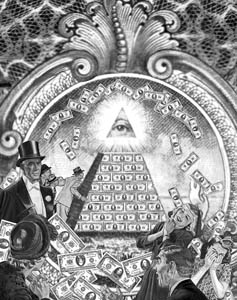![[Metroactive Features]](/features/gifs/feat468.gif)
[ Features Index | Silicon Valley | Metroactive Home | Archives ]
 Illustration by Winston Smith Asian Pyramids? Multilevel marketing schemes thrive within immigrant communities By Raj Jayadev THE SECOND I entered the backroom of the downtown San Jose restaurant, I knew what I was getting into. The language was all too familiar. "The chance of a lifetime." "Financial freedom." "A way to make your dreams a reality." It was a pyramid scheme. In the past month, I've been invited to an "opportunity meeting" by two separate guides--the guys at the Chinese restaurant and an Indian tech worker. I'm not surprised, because despite the rhetoric, Silicon Valley at its core has never really been about technology or innovation. It's about finding a way to be your own boss and get rich while doing it. So in the aftermath of the high-tech meltdown, folks in Silicon Valley--including the newer immigrant communities--are going back to basics. That's why my "once in a lifetime opportunity" hit twice in a month. Pyramid schemes, officially called Multilevel Marketing Plans, are as traditionally American as apple pie. You sell a product whose explosive marketability is just about to emerge. But the real money is made by recruiting others to sell for you. They are your "down-line." They sell for themselves and you, and recruit others to do the same for them. Every man becomes his own empire-builder. It taps the Bill Gates within us all. The Federal Trade Commission says most of the schemes are mathematically destined to fail. So why does it seem like everyone I know has an auntie who got at least a car out of it? At the restaurant, the members of the business enterprise were Chinese and Taiwanese. The products we would hawk were health-related and had names like "Hydro-Glutomax 23." They could do anything. One product restored eyesight to diabetics while removing unsightly moles and cleansing the lungs of smokers. I don't think many of the dozen or so audience members believed the product presenter. Everyone knew the opportunity lay not in the product's effectiveness but in whether you could make others believe in it. The presenters all claimed that joining the company had changed their lives. Many of their stories were adaptations of the classic immigrant American dream. The common thread was the idea that the traditional jobs we work cannot bring about the dream. If you want to own a home, retire in comfort and take care of your loved ones, you have to create your own path, outside of the daily grind. The best presenter was a woman who seemed the least rehearsed. She had no down-lines yet, but she was bursting with hope. She had been a dancer in Asia and was struggling in San Jose, trying to provide for her son while doing temporary jobs. She joined the marketing plan because she was tired of layoffs and not knowing where her next check might come from. People nodded their heads knowingly. Our evening ended in celebration--of the company, our futures and the sense that we were about to join something larger than ourselves. The following week I got a call from an Indian tech worker to whom I hadn't spoken in a year. He insisted I meet him to discuss something urgent. The first thing he asked was, "If I said I would buy you any car you want, what would you be driving tomorrow?" He sounded like the presenters at the restaurant. As the conversation went on, I realized the pitch was honed to my more Indian sensibilities--"I don't know about you, but if I could make it so my parents don't have to work anymore by just 20 minutes a day of selling, I would do it." I did not commit to either plan. In each, I'm supposed to come to a follow-up meeting where I can meet the higher-ups on the pyramid. I don't think I'll go, but honestly, I'm tempted. I used to think pyramid schemes were an old-school white thing, a sneaky way for snake-oil salesmen to shake money out of people like my immigrant parents. But if there's one thing we have learned here, it's that our "post dotcom economy" is deeper than race. It is Darwinian. In Silicon Valley, for immigrants, natives, programmers and restaurant workers, the American dream is not about team. It's about being on top of others. It's a pyramid, as it has always been.
Raj Jayadev (svdebug@pacificnews.org) is the editor of www.siliconvalleydebug.com, the voice of young workers, writers and artists in Silicon Valley.
Send a letter to the editor about this story to letters@metronews.com. [ Silicon Valley | Metroactive Home | Archives ]
|
From the August 29-September 4, 2002 issue of Metro, Silicon Valley's Weekly Newspaper.
Copyright © Metro Publishing Inc. Metroactive is affiliated with the Boulevards Network.
For more information about the San Jose/Silicon Valley area, visit sanjose.com.